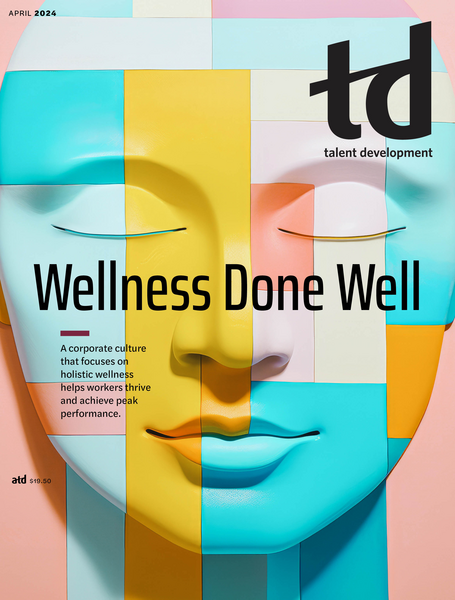TD Magazine Article
An Immersive Turnaround
When an initial version of a training curriculum fell flat, Special Olympics sought a partner to get better results.
Mon Apr 01 2024
The Company: Special Olympics
specialolympics.com
The Supplier: ELB Learning
elblearning.com
When an initial version of a training curriculum fell flat, Special Olympics sought a partner to get better results.
Despite severe need and higher health risks, people with intellectual and developmental disabilities often do not have access to critical health services and education, and they die 16 to 20 years earlier on average than the general population. The Special Olympics health team—made possible by the Golisano Foundation and, in the US, in collaboration with the Centers for Disease Control and Prevention—works to create a world where people with intellectual and developmental disabilities have every opportunity to be healthy. Our work ensures that the health workforce, both soon-to-be healthcare professionals and those currently practicing, receive adequate training and are equipped to care for patients with intellectual and developmental disabilities. Those factors are important steps in realizing high-quality, equitable care for that population.
Background
Established in 1968, Special Olympics helps people with intellectual and developmental disabilities discover new strengths and abilities, skills, and success through the power of sports. With nearly 4 million athletes and Unified Sports partners (athletes without intellectual disability), and 1 million coaches and volunteers in more than 170 countries, Special Olympics delivers more than 30 Olympic-type sports and nearly 50,000 games and competitions every year.
The organization fosters acceptance of all people through programming in education, health, and leadership. It also empowers people with intellectual and developmental disabilities to become accepted and valued members of their communities.
The challenges
Healthcare providers and professionals are key to ensuring that people with intellectual and developmental disabilities can access quality, inclusive healthcare. One of the Special Olympics health team's strategic priorities is to educate health professionals and students who likely have not had any prior experience caring for or working with people with intellectual and developmental disabilities or even with Special Olympics. That priority is fueled by the commitment to increase knowledge of best practices in caring for and communicating with people with intellectual and developmental disabilities. High-quality, inclusive healthcare is vital to health equity and the reduction of health disparities for such individuals.
To meet that priority, in 2022, we worked with a group of interprofessional faculty subject matter experts to develop a five-module asynchronous curriculum on inclusive health fundamentals. In their initial format, the modules did not have any interactive learning opportunities and had simple voice-overs on PowerPoint presentations, thus limiting student engagement in the learning process.
To revise the modules, we partnered with ELB Learning to provide:
An immersive e-learning environment that engages students to help them retain knowledge
Videos, engaging activities, and other learning mediums that appeal to learners while featuring individuals with intellectual and developmental disabilities who share their powerful, lived experiences
Enhanced training offering
We shared all the existing modules with ELB Learning, along with feedback from students and faculty. That paved the way for creating better experiences for learners while achieving the outcomes desired by our clinical education and training team.
To maintain technical accuracy, ELB Learning collaborated with SMEs at Special Olympics. We met regularly throughout the development process to ensure each iteration was progressing toward our goals. The salient features of the solution delivered include:
Self-paced, asynchronous learning modules of 30 to 45 minutes each
Custom interactivity, containing creative activities, visually compelling scenarios, simple gamified interactions, personal stories, and learner roles
An immersive learning experience with enhanced interactions, media (video and audio files), screen animations, and assessment windows
Inclusive and accessible learning environments
The new modules are polished and engaging—exactly what we wanted to achieve. We are continuing to transform other modules and build out clinical curriculums with the help of our solutions partner.
We launched the revised modules in the fall semester of 2023. More than 15 universities in the US will use the modules to train health professional students in the 2023–2024 academic year.
The training has had such a positive impact that additional universities have inquired about using the modules, which will further positively affect the lives and health of people with intellectual and developmental disabilities. In addition, universities in the Middle East and Latin America have expressed interest in using the training curriculums. Given our global presence, we will translate the modules to disseminate them to an international audience.
We've also received requests from employer groups about potentially using the five-module curriculum to train audiences at-large. Further, the training modules are available on a learning management system platform used by more than 4,000 healthcare organizations to train healthcare providers, students, and staff in the US and Canada. The modules are available as voluntary training for health professionals; in the first month of launch, more than 1,000 healthcare professionals completed them.
The feedback from students and healthcare providers has been phenomenal. They have commented on how engaging the training program is and how the knowledge checks add value to the whole learning experience. Through our expanded training and educational offerings, we continue to work on initiatives to improve the quality of life and healthcare services people with intellectual and developmental disabilities receive.
You've Reached ATD Member-only Content
Become an ATD member to continue
Already a member?Sign In

